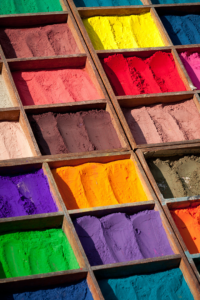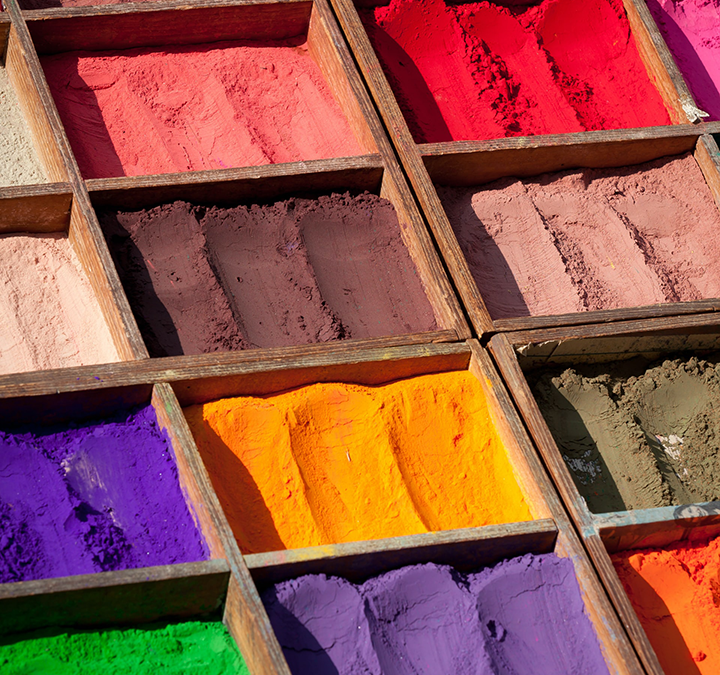When you say creativity personality, a lot of people immediately flick through mental images of designers and illustrators, musicians and artists.
But all personalities have the ability to be creative. And you can be in a creative field without necessarily leaning into the kind of creativity personality that lends itself to invention.
Let’s take a look at what it means to be a creativity personality and what you can do to nurture it

Photo by Thom Masat on Unsplash.
Busting the creativity myths
First, let’s get a few myths about creative personalities into the bin where they belong.
- If you are creative, this alone will get you through.
Not so. Application to the task at hand is always going to be a key component of a so-called creativity personality flourishing. To all the ‘I have a wonderful idea’ people who have talked about it endlessly for years with nary a bit of progress to show, please stop.
You can be as inventive or off-the-wall as you like. If you don’t end up with anything to show for it, you’re not creative.
- Talent and creativity are one and the same.
You can be talented without native creativity. For example, someone who is amazing at drawing but prefers someone to come up with the concepts and the person who can’t draw who can visualise the creative way to tell the story. That kind of pairing works all the time. Creativity is more the conceptual idea or making the something out of nothing before the talent is applied.
- A creative person is allowed to be eccentric.
The creative eccentric is a lovely idea, but it’s hardly the truth of a situation. Plus, making people feel as though they have to be an outlier in order to be creative invites problems. For example, the person who believes their addiction is a massive part of their creative process. Or the person who treats people poorly due to creative genius status.
You don’t have to be swimming in booze or an absolute jerk to work with to get the creative job done. In a post #MeToo world, it’s my sincere hope we put this mythology out to pasture, once and for all.
And by the same token, if you want to be eccentric, if you want your creativity to shine out, do it. Dress differently, introduce those novel analogies to online discussions, treat each day as a challenge for your own creative self if you want. Just remember to do it in a way that serves your creativity, not other people’s notions of what a creative person looks like.
- Creative people don’t care about money.
When we state that money and creativity are at odds with each other, we’re actually advocating for our own underpayment. Why shouldn’t creativity be remunerated? There’s a lot of work, study, practice and equipment that goes into being creative. Assuming the love of the work is enough or worse, that creatives with a sound business model are sell outs, is about doing the work for the systems that devalue our work. Please don’t buy into the whole “real artists do it for the heart” crap. It’s what perpetuates the mythology that leads us to being vulnerable and taken advantage of.
- Creativity is pretty and whimsical work
Not so at all! A creative personality is at heart a problem-solver. You can be a creative maestro when it comes to defending people in court with the law. Or you can be creative in the way you apply technology to solving sustainable energy issues. In fact, a lot of innovation in professions and industries that don’t fit into paint splattered overalls comes from people who apply the same sort of thinking to their work process.
The creativity personality
One of the interesting aspects of the creativity personality is how it functions. There’s a lot of talk these days about introverts and extroverts. It’s often seen as ‘never the twain shall meet’ sort of dialogue. Or there’s an ambivert in the middle trying to explain they exist.
The creative personality is about a balance between introversion and extroversion.
Observe:
Your introversion helps with learning, practising techniques and applying that learning, long hours and in-depth focus. It’s your ability to think deeply that makes concepts easier to grasp and linkages to be made in the problem-solving.
Your extroversion helps with building the community around you, finding opportunities, self-advocacy and standing up for the creative process against naysayers, accepting feedback and yeah, building an audience.
Creativity in its truest form is about striking a balance that works for you. There needs to be a balance between:
- Humility and self-assuredness
- Ambition and selfishness
- Mastering a task and getting waylaid by perfectionism
- Competition and cooperation
- Time free from obligation and leveraging constraints like deadlines to make the work
- What you need to say as a creative person and what the audience wants to hear
- Writing to the audience and fearing the feedback
Different creative personalities may face other challenges as well. You may want to challenge the envelope but not alienate the audience. Or you may want to express your personal story without leaning into self-indulgence. Taking time to realise where your see-saw swings (and your reaction when it does) will help define your progress.
Vulnerability and objectivity combined
To be creative is to be vulnerable. You know with what you are creating, building, making and launching that there is inherent risk. Maybe the pay-off you seek won’t eventuate. It may not hit the note with the audience you expected. Or the work could take on a life of its own in negative and positive ways that you never anticipated.
People are oddly unpredictable beasts at times. We’ve all had those moments where we launch something that flops. Or find a runaway success in something we bashed out as an afterthought five minutes before closing.
That’s why it’s important to be vulnerable and passionate — but also objective.
You need to stay true to your vulnerability and value your connection to the work. Allowing doubt to creep in creates airgaps and makes it harder and harder to connect with the work.
Staying present is also essential. You also need to stay connected by being present when you create. One of the most debilitating and distracting ways to lampoon your ideas before they form is to focus too much on where it will end up.
Objectivity is also essential so you can spot when work is good or not. Sometimes, you can spend a lot of time and energy on something that hasn’t worked. I come across this a lot with freelancers who feel pressured into putting work on Instagram or their blog that they regret later.
If you focus your energy on using the moment of creativity as a learning process instead of the end product, life becomes easier. It takes the pressure off the work, failure becomes easier to cope with, and it means the process of exploring the idea is reward enough.
Objectivity also prevents the creative personality from falling for their own mythology.
Some days mean feeling far more connected with the process than on other days. This is a natural part of life. Taking those days where work feels like work as more of a negative sign than it should creates some huge problems when it comes to consistent creative practice. Inspiration isn’t some wonderful feeling where all the ideas flow. Sometimes, inspiration is more like getting a reluctant fifth grader to focus for that first fifteen minutes of homework in the hope the rest won’t be so much of a chore.
Finally, a creative personality needs work of a different kind
Even when a creative personality is at the top of their game, they still need to keep working on the process. Look for the opportunity to stretch yourself.
Make it your business to study new concepts, play with new toys, take time out to go to conferences and learning opportunities, take seminars, partner up with people to see where collaboration can take you, invest in new tools and software to life your game – whatever works.
But also, don’t forget that part of the work a creative person needs to do is fairly basic: self-care.
You can’t continue to create amazing things if your brain is always tired and stressed, your imagination is overworked, and you feel drawn and isolated. Make sure you connect with health, nature, family and life.
Celebrate moments that make you feel great about you as a human and watch that transform your creativity.

